Kinship
The pasture is a lesson in survival, and we have learned to pay attention when a mother—especially a proven good mother—turns away from a newborn. Several times, we’ve intervened with nature, holding close and bottle feeding an abandoned kid, only to understand as time passes that the mother instinctively knew something about an inability to thrive that we didn’t. Then what seemed a cruel abandonment proves to be more an act of mercy, and then, we owe an apology to whatever mother we have judged harshly and perhaps treated differently in the aftermath. If you were a human, I would call DSS. You should be ashamed of your lazy ass self. You are a bad mother. And of course, there are mothers out in the pasture, as everywhere, who are lesser than, those easily lured away with feed or hay and no second glance at the kid bleating their eerily human cries.
And yet, there are also those abandoned ones who defy all the odds and survive and succeed in spite of it all. They are the heroes—those famous orphans we hold up high: Alexander Hamilton and Malcolm X and Eleanore Roosevelt, Bach, Tolstoy, Ella Fitzgerald. And Jane, our Jane, named for Jane Eyre, who was born to one of our oldest and best mothers—we call her Wilma’s Mama though Wilma is long gone—now one horned and long in the tooth. She gave birth to triplets where Jane was the runt and chose to only nurse two. I called her mommie dearest. I said, you of all mothers!
We had two orphans that spring—Jane and Oliver; Oliver was one of those sad cases we have seen before, coming along slowly, only to then take a turn, and all we had done was lovingly prolong his sad fate. But Jane continued to grow and thrive, getting stronger and stronger, long legged, and confident and strong. With the sound of our voices, she came running for her bottle, calling out to us as the others do their mothers, and for months, we would find her sleeping alone in the hay, away from all the others. It is as painful as watching the shy new child in the classroom, the one who is determined to not show a trace of fear and yet is filled with it. Rufus, our border collie, was kind and attentive, nurturing when we weren’t there, and then slowly, Jane began making a name for herself, strong enough to beat the other kids to the food bowls, fastest one to run toward a new bale of hay and leap up on top of it like Queen of the mountain. She grew stronger and faster than her sisters and began curling up with them at the end of the day. Jane became a force and even began butting Wilma’s Mama with a ferocity that soon brought Jane to the top of the herd. Now you know what it feels like, I imagined her saying.
Jane is now the leader of the herd. She is the one they all follow when moved to another pasture. She is the one out there surveying the territory, standing atop a fresh bale of hay. And yet, she would still rather be with us, her human family, and comes when we call her name, and she is a wonderful, devoted mother to her kids.
I’ve been told I tend to anthropomorphize these creatures but you will never convince me that they aren’t thinking many of the same things we are and acting accordingly. Proof? Jane in these more mature years seems to have forgiven her old, tired mother; perhaps she came to terms with the dilemma that prompted that early rejection, an understanding of the difficulty an older mother designed to nurse two might feel with that third one. What is most interesting is that Jane—while successfully butting and pushing others away from the food bowls, claiming prime positions for herself and for her kids—allows and makes room for the abandoned and bottle fed. I like to think that Jane sees us with bottles in hand, calling across the pasture, and that it stirs in her senses memories of the kid she used to be. There is kinship in survival.


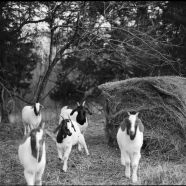






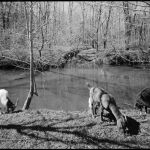
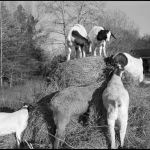
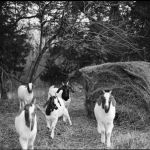
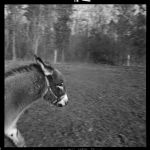
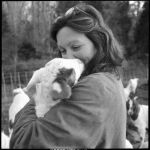
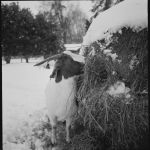
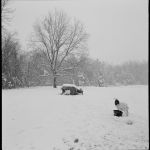
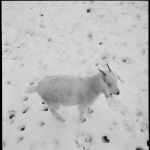
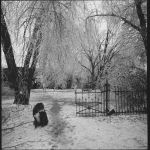
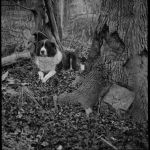
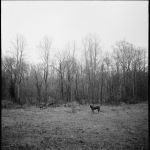
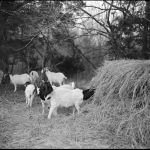
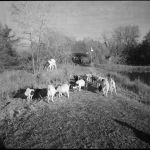
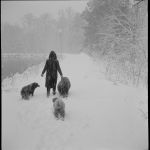
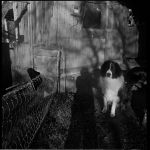
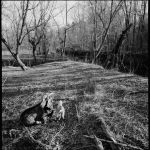

Wonderful, as always Jill.
Such a lovely synchronicity between texts and photographs. Life rushes in. Thank you! Minrose
Beautiful. 💚
Oh, suffice it to say that I grew up with a kennel of beagles over the years. One (eventually named “Dottie” when she managed to live) was the extreme runt of one litter and expected to die any day. For various reasons (this was 1968 or so) she wasn’t given any shots, etc. SO……she caught and lived through every kennel disease you can name. She had no teeth by the time she turned a year old. She was never more than half the size of a normal beagle, but she lived, quite happily (the only dog my mother ever took out of the kennel and into the house), until she was nineteen. Go figure…..
This is lovely, especially since I myself turn to the animal world as a source of joy and connection. I can’t live without having a relationship with an animal: dog, cat, and for years, horses. As for a horse, that is the most mysterious relationship of all, for it is not with a meat-eater! Yet the driving force is the same: hunger, survival, learning to look like you love the person bringing the food rather than just the food itself. Mix them up: food and love and you get the whole universal song that makes the world go round. As for Jill’s writing about the “kid” shuffled to the side because of biological differences that call out the urge to discriminate, well, that echoes into my own life when I was “the polio kid” in school, college, and beyond, never able to shake it because that sort of discrimination is more than skin deep. It’s those experiences that add up to having a strength and toughness few can understand.
Shelley, since you have a relationship with horses, you will enjoy Malaika’s Albrecht’s article, “To Spook or not to Spook”, in this same issue, about a horse, and a rider, who both needed help not to spook.
So lovingly written Jill. Thank you for your tenderness and observations of the animals we love.
I love this! Love and forgiveness grows in all of our hearts. It is up to us to choose to act on it; to share our hearts with others and to remember where we came from. I just love this!! Thank you Jill.
May the blessings be yours with each encounter….
Jill, this is beautiful. So heartfelt❤️❤️
Kinship in survival! I love that phrase, and indeed, the whole article. Many blessings!
Beautiful in all regards. I’m proud we’re pals. I wonder if Buffalo has an ordinance against goats in the back yard.
Exquisite. Like Basho’s line about violets in the grass “they draw the heart so.”